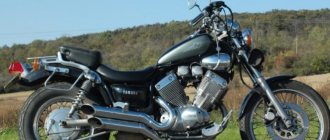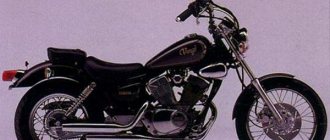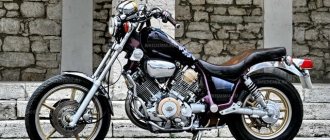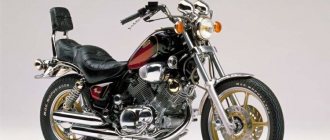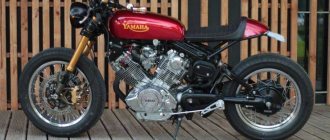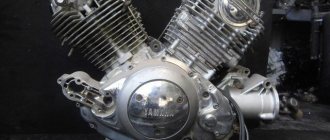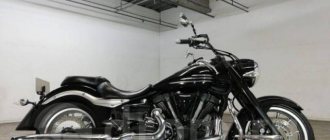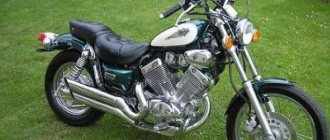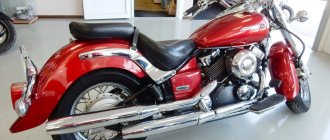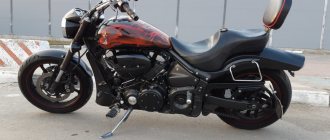The Yamaha Virago XV 1100 cruiser lived on the assembly line for 13 years . Production began in 1986 , the last bike left the factory in 1999 . During production, the motorcycle received several cosmetic changes, but the main parameters did not change.
The bike is based on the Virago XV 750 model, but having inherited its parameters, the bike also received its sores.
The model was positioned for export, most of it went to the USA. Since 1988, the motorcycle has appeared in Japan, as well as in European countries, but it does not arouse much interest in domestic markets.
Appearance
The Yamaha XV 1100 Virago looks typical of a cruiser. Except, perhaps, for the angle at which the gas tank is raised. This moment is too harsh compared to most of his classmates. However, the rest of the motorcycle corresponds in proportion to a typical cruiser.
Regardless of the year of manufacture, the car looks elegant. The version that appeared in 1994 has wheel rims that are no longer cast, but spoked. However, it is worth noting that both options look good. This is not to say that this is the most beautiful bike in the class, or one of them. He looks decent, but average.
Brief history of the model
1986 - start of production and sales of Yamaha XV 1100 Virago. Model: Yamaha Virago 1100 (USA). Factory designation: XV1100S, XV1100SC.
1987 - no significant changes. Model: Yamaha Virago 1100 (USA). Factory designation: XV1100T, XV1100TC.
1988 - no significant changes. Model: Yamaha Virago 1100 (USA, Europe). Factory designation: XV1100U, XV1100UC, 3CH0, 3EF1.
1989 - no significant changes. Model: Yamaha Virago 1100 (USA, Europe). Factory designation: XV1100W, XV1100WC, 3EF2, 3LP1.
1990 - no significant changes. Model: Yamaha Virago 1100 (USA). Factory designation: XV1100A, XV1100AC.
1991 - no significant changes. Model: Yamaha Virago 1100 (USA, Europe, Oceania). Factory designation: 3EF3, 3EG4, 3JK9, 3LP2, 3LP3, 3LP4, XV1100B, XV1100BC.
1992 - no significant changes. Model: Yamaha Virago 1100 (USA, Europe, Oceania). Factory designation: 3EF4, 3EG5, 3JKA, 3LP4, 3LP5, XV1100D, XV1100DC.
1993 - no significant changes. Model: Yamaha Virago 1100 (USA, Europe). Factory designation: 3JKF, XV1100E, XV1100EC.
1994 - appearance of a modification with spoked wheels. Differs in calipers and brake discs. Wired versions are only available in Europe. Model: Yamaha Virago 1100 (USA, Europe). Factory designation: 3EF5, 3JKJ, 3LP7, 3LP8, XV1100F, XV1100FC.
1995 - no significant changes. Model: Yamaha Virago 1100 (USA, Europe, Japan). Factory designation: 3EF6, 3JKM, 3LP9, 3LPA, 4PP1, XV1100G, XV1100GC.
1996 - The standard version with alloy wheels receives brake discs from the spoked version. The model is also available in Special trim with additional chrome. New rectangular stainless steel mirrors. Model: Yamaha Virago 1100 (USA, Europe). Factory designation: 3EF7, 3JKP, 3JKU, 3LPB, 3LPD, XV1100H, XV1100HC, XV1100SH, XV1100SHC.
1997 - no significant changes. Model: Yamaha Virago 1100 (USA, Europe). Factory designation: 3EF8, 3JKW, 3LPE, 3LPF, 4XN1, XV1100J, XV1100JC, XV1100SJ, XV1100SJC.
1998 - no significant changes. Model: Yamaha Virago 1100 (USA, Europe). Factory designation: 3EF9, 3LPG, 3LPH, 4XN5, 4XN8, XV1100K, XV1100KC, XV1100SK, XV1100SKC.
1999 is the last year of production. Model: Yamaha Virago 1100 (USA, Europe). Factory designation: 4XN9, XV1100L, XV1100LC.
Comfort
It’s worth starting with how much such a bike costs today. The price will be at least 140 thousand Russian rubles, i.e. not much. You can no longer get a new motorcycle, so all you have to do is buy a used one. Luckily they are still on sale.
This motorcycle is comfortable to ride with a passenger. Including thanks to the rather high seat back. The saddle is also comfortable. On the road it behaves confidently and predictably at low and medium speeds. So you shouldn't speed up this car too much. Primarily due to the outdated drum brake type at the rear.
Virago 400 version
Later, in 1987, the company released two more models of the Virago line - the export XV-535 and the domestic XV-400 model, which subsequently began to be sold in other countries.
It is the 400 cc “Witch” (that’s how “Virago” is translated) that will be discussed.
The XV-400 was in production until 1998, after which it was replaced by the Drag Star generation with its 400 cc model.
But the XV-400 is still in demand, and it is positioned by its nature as a motorcycle for beginners.
Despite its modest volumetric figures, the Virago 400 is fully consistent in appearance with American-style “cruisers”.
Low seating, small teardrop-shaped tank, high steering wheel and a large number of chrome elements.
Due to the slightly protruding fork forward, which is more typical of classic bikes, the Virago 400 has excellent handling and maneuverability .
Check out the technical characteristics of the Honda Steed 400, the important advantage of which is the reliability and unpretentiousness of the engine.
This 400cc motorcycle, whose name translates as “Stranger”, seems to challenge everyone around it with its outstanding appearance.
Dimensions and weight
The car is medium in size. Given the very serious technical characteristics, it is important to exercise extreme caution when driving. But this applies primarily to those people who are accustomed to safer and more structurally advanced modern cruisers. A dangerous situation in this case is possible due to lack of habit.
Yamaha XV 1100 Virago dimensions are as follows:
- height – 1190 mm;
- width – 840 mm;
- length – 2285 mm;
- wheelbase – 1525 mm;
- seat height – 715 mm;
- ground clearance - 145 mm;
- curb weight – 239 kg;
- Tank capacity – 16.8 l.
The gas tank is quite large, but the consumption is also considerable. However, the car is suitable for traveling from one city to another. The main thing is to understand that this is not a motocross motorcycle, and in principle it is not suitable for off-road use.
Specifications
The Yamaha XV 1100 Virago is well made for its time. However, now many road motorcycles will bypass it. And not only in terms of the engine, but in terms of most characteristics of the chassis. Today's cruisers are superior in transmission and brakes.
| Motor type | V-shaped, 2 cylinders, 4 strokes |
| Power | 61.7 hp |
| Torque | 85.3 Nm |
| Maximum speed | 172 km/h |
| Acceleration to 100 | 4.9 s |
| Fuel consumption per hundred | 5.5 l |
| Drive unit | gimbal |
| Transmission | five-speed |
| Frame | spinal steel |
| Rear suspension | pendulum, two shock absorbers, stroke 97 mm |
| Front suspension | telescopic fork, travel 150 mm |
| Rear brakes | drum, 130 mm |
| Front brakes | two discs, 2-piston calipers, 298 mm |
However, despite the fact that the bike is, of course, outdated, it does not lose its relevance for connoisseurs of rarities. And the motorcycle can really be classified as such, because it is one of the most powerful and famous representatives of the line. So even in twenty years, perhaps someone will be interested in it. Or even interest will increase.
Review of the Yamaha XV 1100 Virago motorcycle
Appearance: For my taste, it is beyond praise, a stylish motorcycle in American retro design, everything is very harmonious and well, the only thing that spoils the impression is the “ears” of the turn signals, they are really huge, it is clear that this is passive safety, but still... From the front the motorcycle looks similar to Cheburashka. Another small drawback in appearance is that the wheels with alloy disks, if there were spokes, it would be +100 to the appearance, however, alloy wheels are more practical, the motorcycle is still not a new one from 1995 and from those spoked wheels that I saw on the old ones motorcycle units
are not affected by rust, in addition, casting eliminates the procedure of tightening the spokes.
General design: as the heart, Viraga has an air-cooled V-twin, at first I was worried about overheating and the archaic nature of this design (after all, a dropsy, or even an oil cooler is more efficient than air), but operation has shown that the engine does not overheat even in the most hot days when driving in a traffic jam, of course, you should not abuse this, and if you have driven for a long time at 6 thousand rpm, you do not need to stop, it is better to reduce the gas and let the engine cool under the oncoming air currents. The motorcycle has a very strong steel backbone frame, part of the supporting structure is the engine, this adds style to the appearance, but I think that in the event of an accident, the engine can be seriously damaged, after all, the mechanism is complex. The motorbike has a cardan drive, a minimum of hemorrhoids, all maintenance comes down to timely replacement of transmission oil.
Engine and transmission: At first, this motorcycle struck me with locomotive traction, after the bandit it seemed like a rocket. The motorcycle has good pickup, traction at the bottom, can easily compete with four hundred in acceleration, with a passenger it feels quite confident in acceleration, but speed is not its strong point, the limit of this motorcycle is 160 km/h. Then I felt sorry for the witch and felt that she couldn’t do it anymore, maybe 92 gasoline, or maybe it’s already old... At such a speed, a frightening vibration arises, you feel as if the soul is flying out of the engine, this motorcycle is not for racing. Of course, with the passage of time, when you get used to the accelerations, it seems that there is no longer the same dynamics as there were before)) but I think everyone has such a progression, from small to large, from slow to fast. The gearbox is a bit harsh, first gear is generally like a guillotine, you turn it on at a traffic light when you’re standing between cars, crap! and everyone stared at you, now no longer hiding)) shifting without pressing the clutch is not comfortable, the cardan transmission interferes, it is less elastic than the chain, so it’s better not to torture the car and shift according to science. The gears themselves seemed short to me, sometimes you have to click through 2, although maybe this is a too dynamic driving style. There are no problems with neutral, it is caught instantly and intuitively, in general the gearbox is not bad, however, it is worth noting the rigid clutch lever with the lack of adjustment of the lever stroke, when driving in a traffic jam, the left hand gets tired quickly, in combination with the steering wheel of the “shitting eagle” type ", fatigue quickly transfers to the shoulder :(. The sound of the engine is good, bassy and solid, it has not yet acquired forward flow, but I still drilled three holes in each muffler. The growl became louder, but at the same time it began to shoot, I will probably have to weld the holes, I think the lack of purging had an effect, smoking forums did not help solve the problem.
The motorcycle has good pickup, traction at the bottom, can easily compete with four hundred in acceleration, with a passenger it feels quite confident in acceleration, but speed is not its strong point, the limit of this motorcycle is 160 km/h. Then I felt sorry for the witch and felt that she couldn’t do it anymore, maybe 92 gasoline, or maybe it’s already old... At such a speed, a frightening vibration arises, you feel as if the soul is flying out of the engine, this motorcycle is not for racing. Of course, with the passage of time, when you get used to the accelerations, it seems that there is no longer the same dynamics as there were before)) but I think everyone has such a progression, from small to large, from slow to fast. The gearbox is a bit harsh, first gear is generally like a guillotine, you turn it on at a traffic light when you’re standing between cars, crap! and everyone stared at you, now no longer hiding)) shifting without pressing the clutch is not comfortable, the cardan transmission interferes, it is less elastic than the chain, so it’s better not to torture the car and shift according to science. The gears themselves seemed short to me, sometimes you have to click through 2, although maybe this is a too dynamic driving style. There are no problems with neutral, it is caught instantly and intuitively, in general the gearbox is not bad, however, it is worth noting the rigid clutch lever with the lack of adjustment of the lever stroke, when driving in a traffic jam, the left hand gets tired quickly, in combination with the steering wheel of the “shitting eagle” type ", fatigue quickly transfers to the shoulder :(. The sound of the engine is good, bassy and solid, it has not yet acquired forward flow, but I still drilled three holes in each muffler. The growl became louder, but at the same time it began to shoot, I will probably have to weld the holes, I think the lack of purging had an effect, smoking forums did not help solve the problem.
Suspension: The front fork is quite soft, which allows you to ignore potholes and holes; for the road conditions of my city this is more of a plus than a minus. The oil was filled with 15W40, which is harder. I think it can be even tougher. The rear suspension seemed rather weak to me, maybe the shock absorbers are no longer good enough, but when driving with a miniature passenger, it hit a speed bump once. In general, I like the way this motorcycle rides; on a road bike, your arms are tense for the most part and bumps send tremors into your body; you don’t care at all, you ride like you’re driving a big car, small bumps are eaten up by the fork and the rear loaf. The motorcycle is surprisingly very maneuverable, rides well between the rows and turns well, however, the tires are not very good (although they are new), or I give a lot of gas, sometimes the wheel makes it clear that you are going too far and slips, lifting your rear in displeasure, Considering that the motorcycle weighs about 300 kg, the feeling of such lack of control is not very pleasant. After the road test, I had to get used to a larger turning radius, but it’s a matter of experience and habit; with gaining experience in driving, the motorcycle steers perfectly, very obedient and friendly.
Brakes: The brakes on Viraga are the most unpleasant moment, the two front discs don’t make a difference here (I can imagine how one would brake). They are frankly weak, but I think this is intended by the designers, the brakes are made elastic so that the wheels do not block; if you accelerate a 300-kilogram fool, then keep in mind that you will have to stop it with weak brakes. If on a road car under normal conditions only the rear brake is used, then on Viraga there is almost always combined braking with front and rear together. Surprisingly, the brakes have a wide range and rarely lead to locking. When the wheels are locked, the motorcycle, oddly enough, retains directional stability, but squeals worse than the Volga GAZ 21 from Soviet films. ))By the way, when driving with a passenger, you have to put aside in your mind about twice as much braking distance.
Other problems: Having read horror stories about the overrunning clutch, I began to imagine its quick replacement. The motorcycle has this weak point, however, foreign countries will help us, spare parts from this problematic group, and their copies, are available in abundance on eBay, so the devil is not as terrible as he is painted. So far everything is fine with the clutch, but the starter needs maintenance. I recommend installing a windshield immediately, because... at speeds above 120 km, the air flow hits your chest and it’s not very pleasant.
General conclusions: I like the motorcycle, after it demonstrated dubious speed qualities, I thought about parting with it, but I look and understand that I simply like it, like I like a stylish, good thing. I thought about it and decided to skate it for one season after making some changes.
A year ago I became the owner of this motorcycle, for a long time I chose a chopper with a liter engine, usually expensive new choppers or small cars, I chose between Intruder 1400, Vulcan 1500, Shadov 1100 and of course Viraga 1100, on favorable terms they offered Viraga, a Californian model, but so and did not reach America.
The motorcycle is truly legendary, it was produced from 1981 to 1999, then it was upgraded to a dragstar, which are still in production and for the most part have only external differences.
The appearance of the motorcycle is the most chopper-like, a beautiful fork with a high handlebar, a comfortable seat, a V-shaped engine, an imposing position, the sound of the engine deserves special praise, not loud but a very bassy and beautiful rumble makes it clear that there is serious equipment under you.
The dynamics of the motorcycle with a torque of 83 N/m at 3000 rpm allows you to accelerate at lightning speed, as choppers should, the hundred part is gained instantly, and above that it is more smooth. In skillful hands, Viraga accelerates to 100 km/h in 5 - 6 seconds, cruising speed is 120 - 130 km/h, maximum speed is 190, and if necessary, Viraga easily reaches maximum speed. When you're driving on the highway, you don't feel much difference whether you're driving with or without a passenger. No problems with overtaking, you need to overtake, turn the handle and overtake everything you need to. Maneuverable thanks to the low seating position.
A good motorcycle, the driver and passenger seating position is one of the most convenient and comfortable, a large seat, a solid backrest.
The motorcycle engine is part of the frame, placed forward, which gives the Viraga a specific and individual appearance, making the motorcycle look very solid. The engine operating speed is 3000 - 4000 rpm, the response to the throttle is very clear. The engine is designed relatively simply; if necessary, it can be completely rebuilt in a garage.
Despite the large volume and power, the motorcycle is very calm, it doesn’t try to escape from under the saddle; if you want to go slowly, you can go slowly without any problems, which is what I actually do in most cases. The motorcycle is not suitable for the most experienced motorcyclist.
However, the motorcycle also requires competent attention, adjustments, minor repairs, everything must be done on time. For those who think that they bought themselves a Japanese one and there is nothing to do with it, they are mistaken; with the purchase of a motorcycle, the range of auto tools has grown to a decent size.
Main characteristics Engine - volume 1063 cm3, two valves per cylinder, power 61, torque 83 per 3000, carburetor, tank 19 liters. 5 speeds. Motorcycle weight 230 kg, speed 190, cardan.
pros
Relatively affordable price 120 - 160
Good dynamics, maneuverability, comfort
Reliable engine and gearbox
cardan
appearance - I really like it, unlike some newer choppers.
relatively simple engine design.
It is convenient to configure all the main elements in accessible places.
Original tachometer, very rare on a chopper.
Minuses
Difficult to adjust carburetors, the motorcycle is very demanding for perfect tuning
An unsuccessful starting system, starter, retractor, gear, relay, something will definitely mess with the brain, but in principle it can be eliminated.
Lack of distribution in Krasnoyarsk, difficulty with spare parts, competent advice.
Insufficient safety margin of the cardan drive, under extreme loads it can tear off the nut securing the crosspiece, for normal people this is not critical, but the cardan should be stronger.
The engine crankcase is made of two longitudinal halves, it is not convenient to disassemble and repair.
Despite everything, the overall assessment of the motorcycle is only positive. Viraga is one of those motorcycles that you buy for many years of faithful service and friendship!
What do the owners say?
According to reviews from those who have been using the car for a long time, this is a good option for those who want to combine leisurely travel with the pleasure of driving a cruiser. Maintenance is not that expensive, although it is not easy to get spare parts. If handled carefully, the motorcycle will not break down often.
Only careful operation in the garage and on the road will protect an already used car from new problems. Particular caution is advised regarding brakes. More specifically, the rear drum. Not that it is bad in itself, but many owners agree that the type of drum brake itself is outdated and inferior in every way to a disc brake.
They say that this motorcycle will primarily appeal to those who are riding a cruiser for the first time. For example, I switched from a sportbike. One of the reviews described how a man who had been driving a sports model for eight years first drove this example and was incredibly pleased. At the same time, many experienced bikers in the class consider the XV 1100 Virago to be mediocre.
According to those who live in areas with bad roads, this cruiser, like other representatives of the class, is not the best choice. And the problem here is not only the low ground clearance. The elongated design of the motorcycle itself is not intended for constant riding over pits and potholes. This “ship” requires a relatively flat and spacious track.
In conclusion, it is worth noting that the Yamaha XV 1100 Virago is an interesting bike, primarily for connoisseurs of such equipment. Others are unlikely to like him. Even those who are used to modern cruisers are unlikely to appreciate this vintage example. Well, for its time the car was not bad. Perhaps time will pass, and many people will want to buy this bike. At least among collectors.
Peculiarities
The bike has quite a few differences:
- 2 springs on the rear shock absorber;
- rear wheel drum brake;
- large stroke of brake levers;
- I inherited from my progenitor a sore with an overrunning clutch (and you always need to keep a few in reserve in the garage);
- cooling system - even with an air filter, the bike does not overheat either when riding or when standing in traffic jams;
- the need to very accurately adjust/synchronize carburetors;
- Sometimes there are problems when starting (it doesn’t depend on the weather outside - a legacy from the XV 750), but it can be adjusted.
Of course, the key feature is called the cardan drive - change the oil and all maintenance on time.
